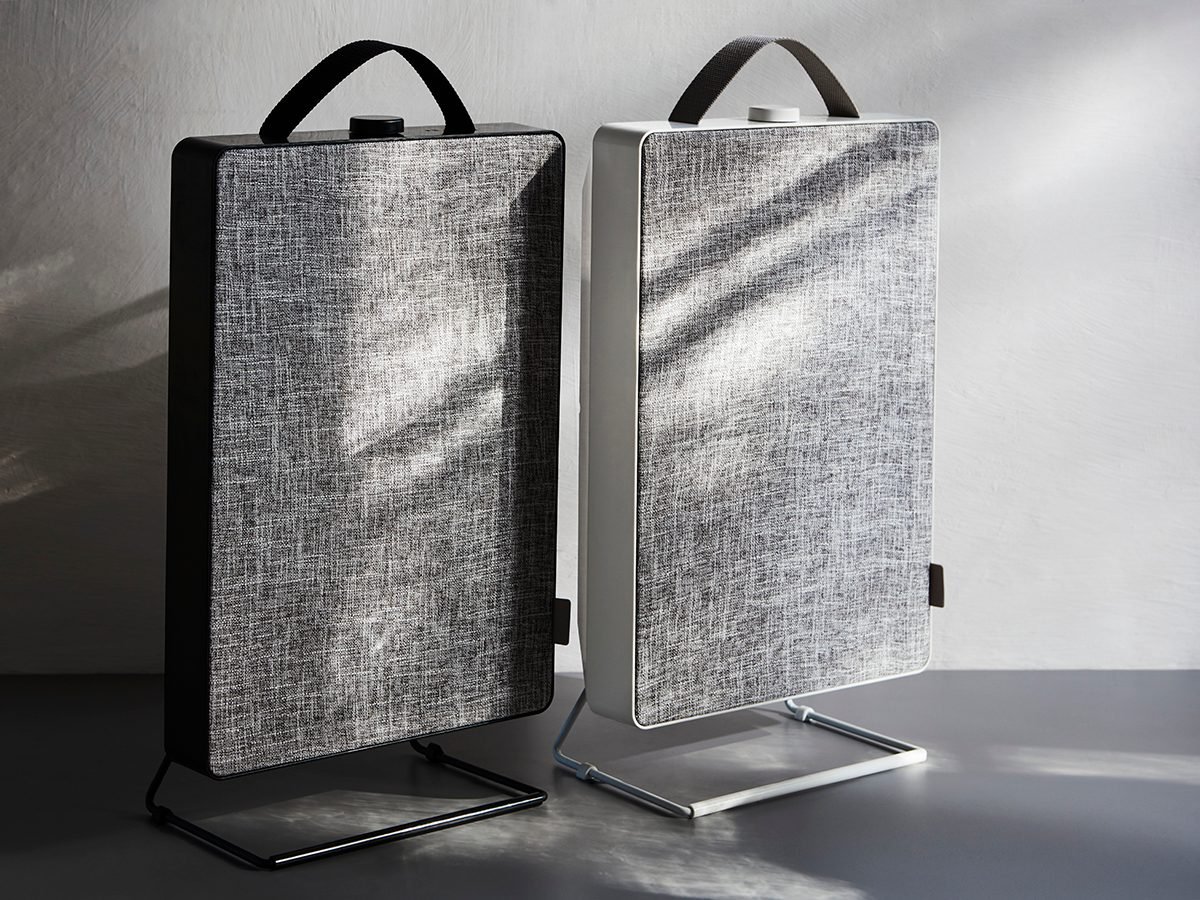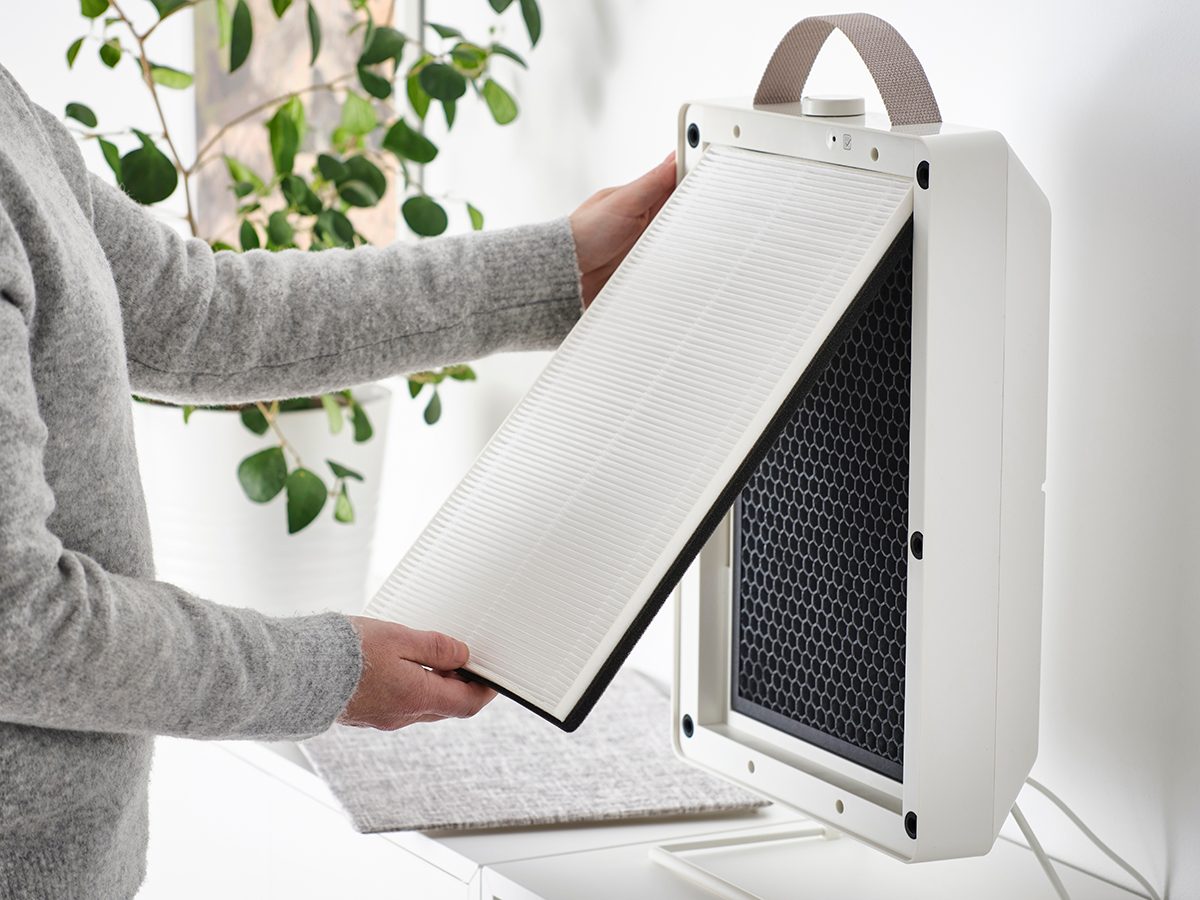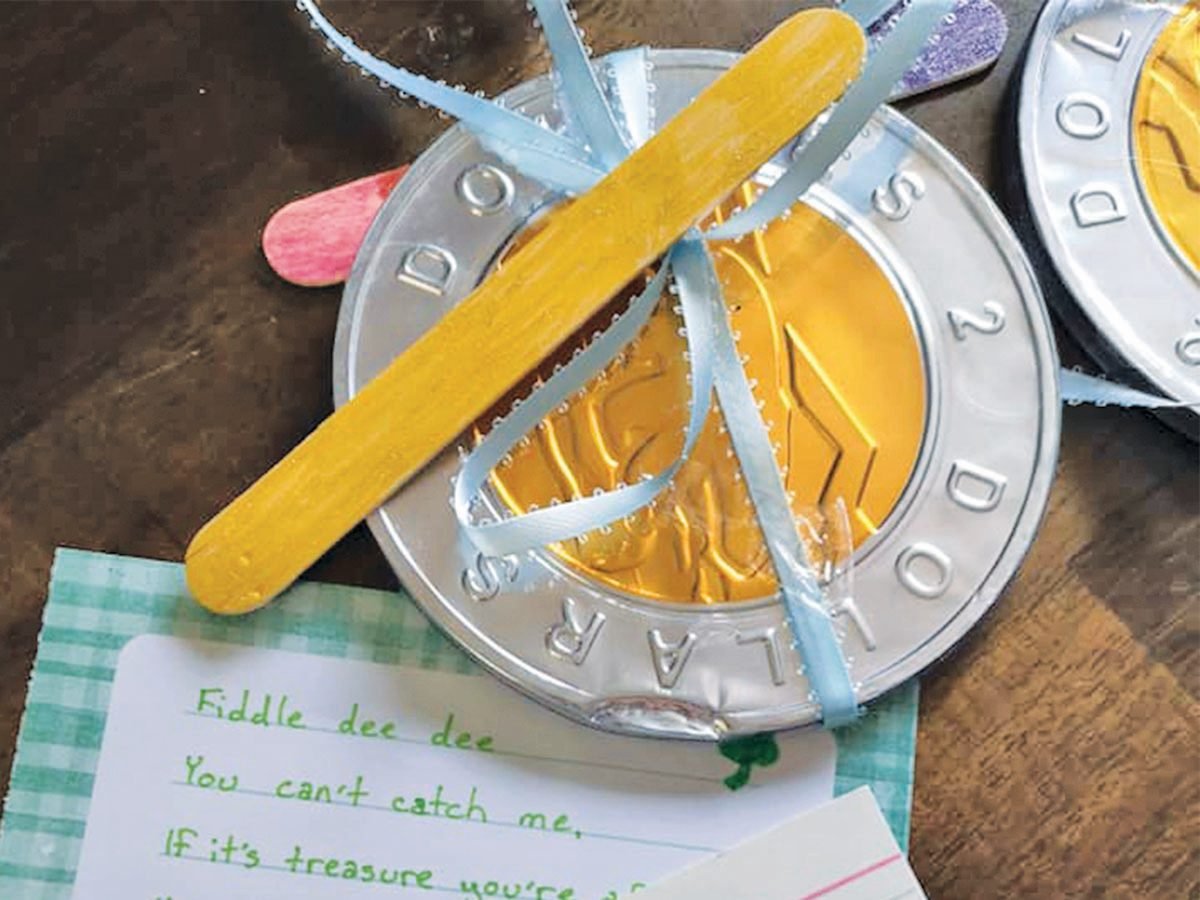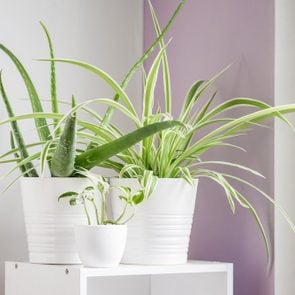With more than five million Canadians currently working from home due to the pandemic, we’re spending a lot—if not all—of our time indoors. That means that throughout the day, we’re breathing in indoor air contaminants, from microscopic dust mites hidden in carpets to toxic vapours from disinfectants. It’s not only gross to think about, but it could also be affecting our health. According to the Canadian Centre for Occupational Health and Safety, exposure to poor air quality can cause symptoms such as headaches, sinus congestion and eye dryness—a condition I experience on a daily basis.
That’s why, when the team at IKEA Canada offered me the chance to test drive their very first air purifier for the home ahead of its Canadian release, I immediately cleared out a spot for it in my tiny office (a.k.a. my bedroom). Although I’ve been working from home for over a year at this point, I hadn’t thought much about indoor air pollution—or how it might affect me—given the other stressful situations we’ve all been dealing with. But it’s also become harder to ignore how quickly the dust piles up (where is it coming from and how does it get everywhere?) and if it’s actually something in the air that’s further irritating my chronic dry eyes. Since the future of work seems to be permanently remote for many, it’s also seems increasingly important that our home environment is healthy.

Available online and in-store across Canada beginning on April 1, 2021, Förnuftig combines a HEPA (high efficiency particulate air) 12 filter with a carbon filter to remove at least 99.97 per cent of airborne particles and gases. The sleek unit operates on three different fan settings. On low, the sound is virtually undetectable and perfect for overnight use. When there’s more particulate in the air—after you’ve cooked a meal on your stovetop, for instance—you might turn it up to the highest setting for maximum air filtering.
The Förnuftig air purifier has an approximate clear air delivery rate (CADR) of 130m3/hour—the volume of its filtered air output—and was specifically designed with smaller spaces in mind. Its slim shape, relatively light weight and nifty handle makes it easy to transport from room to room as needed. It comes with a stand, but for those without floor space to spare, the device can also be wall-mounted either horizontally or vertically. As you might expect from IKEA, it’s also accessibly priced: at just $69.99, it’s one of the more affordable air purifiers on the Canadian market.

“At IKEA, we believe clean indoor air shouldn’t be a luxury for the few, and that’s why one of our main priorities in developing the Förnuftig air purifier was to achieve a low price for both the air purifier and the filters,” says Mathias Karlsson, director of home smart at IKEA Canada.
Like all the other IKEA products I’ve previously built, the Förnuftig was a breeze to put together. The entire process took less than five minutes—simply install the included filters and snap the fabric cover back into place. With its flat design and versatile colours (the cover is grey and the air purifier comes in either black or white), it blended in seamlessly with my room’s furniture and décor. From a maintenance perspective, you’ll need to toss and replace both filters every four months (single filter replacements are available through IKEA), and vacuum the cover once every few weeks. While I can only imagine all the gunk trapped within the filters, ultimately it gives me peace of mind to know that the air purifier’s soft hum means I can breathe a bit better.
Next, we ask the experts if an air purifier can kill coronavirus germs.
As many of us remember, last March heralded a difficult time not only for Canadians but the world. Our household began the daunting task of home-schooling as well as giving our kids, Charlotte and Oliver, cautionary talks on how to stay safe in this unusual time. We did not let it get our spirits down, though. The kids were able to celebrate St. Patrick’s Day at their school right before the shut down by wearing green and making “leprechaun traps.” My husband, Keith, also decided to use the day itself to turn the gloom of quarantine into a fun event.

In preparation, we had the kids set up a “leprechaun trap” in the living room the night before, leaving a big chocolate loonie as bait to lure in any roaming little green men. The trap worked—to an extent. A little green fellow did happen by our house, even taking a bite of the coin, but managed to escape the trap—leaving a note for the kids with clues for them to follow so that they could try to catch him:
Fiddle dee dee,
you can’t catch me.
If it’s treasure you’re after,
you must run faster.
Put on your shoes,
and follow my clues.
The first clue sent us outside into the cold March day. We went running to an old road, now empty of houses and street signs, where our daughter, Charlotte, first learned to ride her bike. We searched around and found a second clue taped to a tree:
Swinging is lots of fun,
but there is only one park,
where it can be done.

Oliver is a big fan of playgrounds and knows all the ones in our area, and there is, in fact, only one that has a swing set, so off we went at a run to try to catch up to our little leprechaun friend. The kids went to the swings instantly, where they found their next clue:
People study here,
what they need to learn,
whatever you borrow,
you must return.
We pondered a moment before Charlotte looked across the street to the library and determined that we had to go there. She was right and found our next clue:
Different vehicles make different sounds,
beep beep, vroom vroom,
but this vehicle makes a boom boom.

Living on a military base it is not hard to figure out what vehicle would make that sound and the kids knew just where to look. Worthington Park is a popular walking route for us as the kids love to check out all the various tanks displayed there. We looked over several of them before we found our next clue attached to one of them:
At the end of the rainbow,
is where you must go,
if none is in sight,
try the…?
This one took some thought. What rhymed with rainbow? We walked around the park, pointing out various things to see if they matched the rhythm of the clue. We came to the top of a hill and looked across the way and spied a gazebo; rainbow, gazebo…with renewed energy, the kids were off running again!
Next, check 12 more great ways to celebrate St. Patrick’s Day at home.
Red flags are big clues
You don’t jump in the water when you see a red flag at the beach, right? The same is true in a relationship, whether it’s your second date or your second year together.
If something is giving you pause or crossing your boundaries, pay attention, says Jane Greer, PhD, a marriage and family therapist in New York City and author of several books, including What About Me? Stop Selfishness From Ruining Your Relationship.
While you might be inclined to brush off red flags, don’t. They might be your first clues that this person will keep exhibiting these problematic behaviours in more facets of your relationship, says Greer.
Read on to see what relationship experts say should set off warning bells when you’re dating or already a couple.
Things are moving way too fast
You and your new flame haven’t left each other’s side since that second date, and are even talking about moving in together because it just feels so right.
Why it spells trouble: “We all love that new-relationship energy, but where’s the fire?” notes Dana McNeil, a couples therapist in San Diego. “If somebody doesn’t want to take the time to know who you are before they decide if you’re a good fit for them, or if they’re a good fit for you, are you just trying to lock and load a relationship, [regardless of] who it is?”
Is it fixable? Yes, if you slow down a little. “Who you date should be an accessory to an already fantastic life, so you need to recognize why you’re willing to move so fast,” says McNeil. “You shouldn’t have so many voids in your life that you’re looking for this insta-person to come in and make your world feel whole. So this is a red flag for you to slow down, right?” Even if you feel fate has brought you two together, take time to enjoy the ride. (Read these tips to improve your relationship in three easy steps.)
Something fishy is going on with your finances
Your partner is in charge of the household bills, which is fine. Until you get several notices that you’re behind with the mortgage payment—and the cable is about to be shut off.
Why it spells trouble: You don’t really know if there’s financial fidelity going on, or your partner is siphoning off the money to pay for gambling debts or drugs, says Christie Kederian, a licensed marriage and family therapist in Pasadena, California. “But you need to get to the bottom of it, because it could signal a really negative pattern of deceit,” she says.
Usually, trust is apparent during your dating days. “I always say that with phones and devices, you should feel like you can always look at your partner’s phone and there wouldn’t be a problem,” Kederian says. “But you shouldn’t feel like you should have to look at it. That’s the kind of trust level that you should have.”
Is it fixable? Yes, if you talk it out. Often partners don’t want to discuss difficult topics, but you have to bring it up in the moment so you can get to the root of the problem, says Kederian. True, your partner could be pocketing money. Or they could be too overwhelmed to handle the finances right now.
“What you really want to do—the gold standard—is getting to a place where you can say to your partner, ‘Is the thing that I’m asking for feel like it’s not possible for you?'” Kederian says. “And it’s a lot better to be honest with that, so then you can shift expectations within the relationship and at least build that awareness.” (Watch out for these common social media mistakes that can damage your relationships.)

Your date monologues without end
You’re having coffee and your date goes on and on without asking you anything. Or you find yourself doing most of the talking. “Do they reciprocate? Are they interested? Are they curious about you?” asks Greer.
Why it spells trouble: If there’s an imbalance between how much of yourselves you each share, you may find your partner’s only interested in telling you about their day—not in hearing about yours. “The relationship is going to be like a seesaw, but you’re the one on the ground keeping them in the air. You’re doing all the heavy lifting,” says Greer.
Is it fixable? Maybe, if it doesn’t become a pattern. If this happens during the first couple of dates but there were other places where you connected, you may want to give this new person a second chance, Kederian says. It may be that your date was nervous or lacks social skills (don’t we all during the pandemic?).
“But if it becomes a pattern, and you feel like they’re not really getting to know you as a person—it’s just the idea of you or the idea of talking to somebody—it’s best not to move forward,” she says. “It’s much better to be decisive earlier on.” (This is the scientific reason why couples always get back together after a breakup.)
Your date eats off your plate
You’re having dinner and your date reaches across the table to nab a French fry without asking—and then doesn’t offer you anything in return. And it happens all the time, and with things more important than a French fry.
Why it spells trouble: “It’s a boundary issue,” says Greer. The person may have a sense of entitlement and feel like they can help themselves to what is yours without respecting your wishes, whether it’s your possessions, your space, your food—whatever. And there’s no reciprocity. If you ignore the behaviour, your beloved may always expect you to spend time with them instead of your friends (without asking what you prefer). Worse, they might take money or other things, Greer says.
Is it fixable? Yes, if you come to an understanding. Call out the behaviour—say you’re happy to share as long as your date asks first. “If they agree and follow through, that’s respect and that’s fine,” Greer says. (A relationship expert reveals the four factors that create romantic chemistry.)
You’re always waiting
You make a date for 3 p.m. and your person rolls up an hour and a half later and says, “OK, babe, ready to go?” This happens nearly all the time, without a heads-up text for explanation.
Why it spells trouble: Your date isn’t really respectful of your time or your feelings, says McNeil. And by not bringing it up or excusing the behaviour, you’re minimizing your own feelings just to make the relationship work.
Is it fixable? Maybe, if you get an apology. Instead of saying, “I guess I need to buy you a watch,” which is just passive aggressive and guaranteed to make your partner defensive, be straightforward, McNeil advises. Say, “It feels disrespectful when I’ve been waiting an hour and I don’t hear from you. It would mean a lot to me if, when you’re running late, you called me at least a half an hour before, so that it feels like I’m having my time respected.”
Then watch your potential partner’s reaction. If you hear an apology and an explanation (“Being at home for months has ruined my sense of time”), then that’s probably OK. “If you get, ‘I don’t understand what the big deal is. You have stuff you can do around here,’ that’s not empathy,” says McNeil. “If you disregard my thoughts and feelings and tell me they’re not important, that’s not going to bode well for us in a relationship moving forward.” (Read these tips on how to deal with a depressed spouse.)

You’re always traveling to a date
All of your dates happen on their turf—a meal in their neighbourhood, hanging out at their place—even though it means a schlep for you. “You’re the one who’s putting yourself out, the one who’s going, getting, doing, bringing, helping,” says Greer.
Why it spells trouble: “If you’re extending and it’s not coming back your way, you’re going to wind up either as a martyr or a giver, sacrificing yourself and being angry and resentful and saying, ‘Well, what about my needs?'” Greer explains.
Is it fixable? Maybe, if your partner changes. Before you jump to the conclusion that your date is thoughtless or selfish, ask yourself whether this a character thing or a behavioural thing, advises Kederian. Bring the topic up without being judgmental and then see what happens. Say, “I really love getting to know you and I’d appreciate it if we could meet someplace closer to me every other date.”
“If you’ve expressed your need, and they don’t even acknowledge or try to work to that, then I would say maybe that’s not a fit there,” Kederian says. (Try these 40 creative romantic ideas to say “I love you.”)
Your partner is avoiding difficult conversations
Your beloved is hanging out with their friends and working late. You aren’t spending much quality time together, in bed or out. But when you say you want to talk about it, your partner shuts you down or makes you feel guilty for questioning them. Or, even worse, they turn around and attack you.
Why it spells trouble: Your partner could be having an affair, but you won’t find out for sure if you can’t have these difficult conversations. This is true for any type of transgression—whether it’s about sex or money. “They’ll give you answers that don’t add up: ‘Where’d the money go?’ ‘Oh, I went shopping.’ ‘Who is she?’ ‘Oh, it’s just a really good friend at work,'” Greer notes.
Is it fixable? “Anything is fixable depending on how they respond,” says Greer. Your partner might be avoiding you for another reason; maybe they’re depressed or overwhelmed at work and at home. The trick is to find out, maybe even in front of a couples’ counselor. (Here are the 12 things to never do after a fight.)
Your date makes plans without you
Tennis is your partner’s passion—to the exclusion of you. Whether it’s watching tournaments on TV or playing with pals, the weekends are taken up with their interest, whether you’re interested in tagging along or not.
Why it spells trouble: People who are too independent don’t take others into consideration, says McNeil. “It’s also a warning sign that maybe they’re not going to know how to compromise, or negotiating isn’t that important for them,” she adds.
Is it fixable? Yes, if your partner is willing to change. This is another conversation about values you’ll need to have, earlier rather than later. “Ideally, what we want is interdependence,” McNeil explains. “I have outside interests that excite me that maybe my partner doesn’t care about. But I’m equally invested in spending time in the relationship. I’m just as passionate about this person, and the things I get to do with this person, as the things that I do individually.”
If your potential partner isn’t interested in that type of relationship, then you’ll either have to put your needs second (bad idea!) or go your own way. (Here are 10 first date questions you should always ask.)

Your partner wants to spend every moment with you
On the flip side, maybe your partner doesn’t want you doing anything without them. Why go to a movie with friends when you can go together? Or why go to a dinner with your family when you can spend time with them instead?
Why it spells trouble: Isolation is a tool commonly used by emotional and physical abusers. According to Break the Silence Against Domestic Violence, a nonprofit that helps those affected by domestic violence, it helps abusers convince victims that their controller is the most important person in the world.
Is it fixable? Yes, but only if you start taking some solo time. Spending lots of time together, especially early on in a relationship, is normal and fun. But you also need time with other people and time alone. If you feel overwhelmed or that you lack control, talk to your partner.
Tell them your outings with friends and family are important and see how they respond. You may want to suggest you take a day apart so then you’ll treasure your time together even more, suggests Break the Cycle, an organization that supports healthy relationships for young people. If your partner isn’t accepting of the ideas, it’s probably a good idea to get out. (Here are the 15 signs that you may have a love addiction.)
Red flags that scream trouble
You’d think that someone putting you down or making jokes at your expense would qualify as red flags. Ditto someone being rude to others—especially those in the service industry, like waiters or bartenders. But those are more than red flags. “They’re like the flag holders in the marching band,” says Greer.
They show a lack of empathy, and there’s really not much of a conversation you can have about that, Kederian explains. “That’s not something you will be able to drastically change, or hope that person changes,” she says. “That might just be more of how they are.” In other words, get out fast.
The bottom line
Relationship flags can be red and glaring, a clear sign to get out. Other times they’re yellow flags that tell you to move more cautiously. “I always tell my clients [to] first notice things. Just hold that space without turning it into a red flag so that you can feel free to get to know somebody,” Kederian says.
If you’re aware of your boundaries, you’ll be able to spot the difference between red and yellow flags—and pick a partner who has more positive attributes.
Next, here are 7 secrets to make your relationship last.








